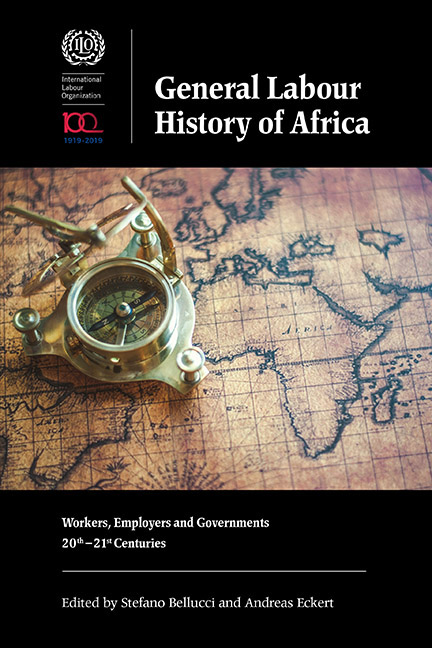Book contents
- Frontmatter
- Contents
- List of Maps and Figures
- List of Tables
- Notes on Contributors
- Foreword
- Acknowledgements
- The ‘Labour Question’ in Africanist Historiography
- Part I Free and Unfree Labour
- Part II Key Sectors
- Part III International Dimensions and Mobility
- Part IV Varieties of Work
- Part V Entrepreneurs and Self-Employment
- Part VI The State, Unions and Welfare
- 18 Labour and the State
- 19 Trade Unions
- 20 Social Welfare
- 21 Mutualism and Cooperative Work
- Part VII Conclusions
- Select Bibliography
- Index
20 - Social Welfare
from Part VI - The State, Unions and Welfare
Published online by Cambridge University Press: 21 September 2019
- Frontmatter
- Contents
- List of Maps and Figures
- List of Tables
- Notes on Contributors
- Foreword
- Acknowledgements
- The ‘Labour Question’ in Africanist Historiography
- Part I Free and Unfree Labour
- Part II Key Sectors
- Part III International Dimensions and Mobility
- Part IV Varieties of Work
- Part V Entrepreneurs and Self-Employment
- Part VI The State, Unions and Welfare
- 18 Labour and the State
- 19 Trade Unions
- 20 Social Welfare
- 21 Mutualism and Cooperative Work
- Part VII Conclusions
- Select Bibliography
- Index
Summary
In the last decades of the nineteenth and first decades of the twentieth century, widespread wage labour emerged across the African continent for the first time. The continent's population and economy remained, as it would throughout the twentieth century, largely rural and agrarian. Forced labour, driven by both colonial states and private employers, also remained widespread. However, the growing importance of capitalist mining and agriculture, along with the increasing development of roads, railways and other infrastructure by colonial states, produced a market for wage labour in locations across the continent on an unprecedented scale.
In this same period, European intellectuals were in the midst of a fervent debate on the ‘social question’. The rapid transformation that nineteenthcentury capitalist expansion had initiated called for a reconsideration of welfare, well-being and the very structure of social life. This debate might have seemed distant from the African context at the time. The emerging groups of urban wage workers on the continent were assumed by colonial states to be temporary sojourners from their natural and permanent homes in the countryside. The welfare and social reproduction of African workers were seen as the domain of the rural and traditional. However, as capitalism and colonialism continued to disrupt and dislocate extant forms of social life, this assumption was increasingly exposed as fiction. Already by the 1930s the question of social welfare had been brought to the centre of colonial administrators’ attention through burgeoning nationalist and labour movements across the continent. Since the period of late colonial reforms, through the developmentalism of the post-independence era, and into the more recent focus on poverty reduction, social welfare has remained a central focus of African political debates and policy initiatives.
Social welfare in Africa has had both political and economic dimensions. Waves of contention, advancing demands for independence and democracy, have repeatedly reshaped the relationship between states and citizens. The state provision of welfare first emerged from the colonial authorities, who hoped that improving standards of living would quell growing demands for political transformation. For post-independence states, welfare provided by the government and by private employers was a tool for securing the support of workers, who were among the most organized, and in some cases oppositional, constituencies in the political landscape of many new countries.
- Type
- Chapter
- Information
- General Labour History of AfricaWorkers, Employers and Governments, 20th-21st Centuries, pp. 553 - 584Publisher: Boydell & BrewerPrint publication year: 2019



